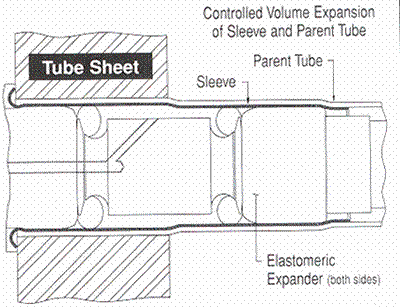

STRAIN CONTROL SLEEVING EXPLAINED
STRAIN CONTROL SLEEVING
Strain Control Sleeving is one of the most cost effective and rewarding solutions available. Strain Control Sleeving provides the ability to refurbish and bring new life to heat exchangers otherwise doomed to a re-tube job, which can cost a "bundle"!
Most heat exchangers are designed with a certain amount of extra tube capacity to allow a percentage of tubes to be plugged during the life of the exchanger. Two primary causes of tube failure, which often result in tubes being plugged or replaced, are erosion and corrosion. In fact, heat exchangers are often completely re-tubed to repair tube failures which occur only at the tube ends, or directly behind the tubesheet.
Strain Control Sleeving offers an economical method of prolonging the life of aging or failing heat exchanger tubes by installing sleeves (ferrules) to restore lost tube material or as sacrificial barriers to the damaging elements which cause the tube loss.

Strain control Sleeving is a two stage process which pre-expands a prepared metal sleeve into the damaged or failing section of the tube. The first stage expands the sleeve at a pre-calculated hydraulic pressure beyond the sleeve yield strength, but less than combined yield strength of the sleeve and parent tube.
The second stage expansion is controlled by injecting (at a higher pressure) a pre-determined volume of water to control the radial expansion of the sleeve and parent tube to produce a constant interference fit between the sleeve and parent tube.
THE PROCESS
Strain Control Sleeving is compatible with any number of alloys, lengths, or sizes of tubes. The process of Strain Control Sleeving is performed by calculating the yield point of the chosen sleeve and then to pressureize the sleeve slightly past its yield point. This allows the sleeve to expand and make 100% contact with the parent tube. Next, a secondary pump engages, pumping a pre-calculated volume of water to further expand the sleeve and fill in the anomalies in the parent tube.
THE APPLICATIONS
Strain Control Sleeving has been performed in plants and refineries throughout the US and around the world. Strain Control Sleeving is an attractive option because it remedies the area of the tube where almost 90% of the tube failures occur, 6-8 inches from the tip of the inlet end of the tubes. These failures occur generally from a phenomenon called erosion or corrosion. By addressing this problem through Strain Control Sleeving, the exchanger can be up and running with minimal downtime and cost compared to a complete re-tube. Through the use of thin wall sleeves, the exchanger can return to normal or near-normal efficiency.

Sleeves can be manufactured in a wide range of sizes and materials for nearly any sleeving job.
From Hastelloy C-276 to carbon steel, sleeves can be tailored to suit your application.
